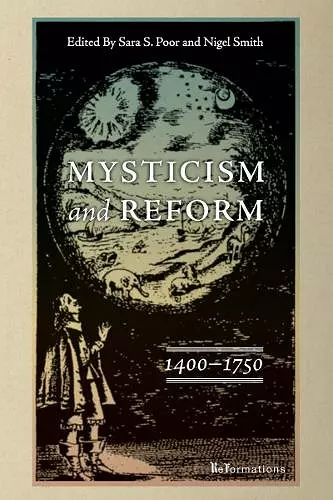Mysticism and Reform, 1400–1750
Nigel Smith editor Sara S Poor editor
Format:Paperback
Publisher:University of Notre Dame Press
Published:15th May '15
Currently unavailable, and unfortunately no date known when it will be back
This paperback is available in another edition too:
- Hardback£90.00was £100.00(9780268175115)

The apparent disappearance of mysticism in the Protestant world after the Reformation used to be taken as an example of the arrival of modernity. However, as recent studies in history and literary history reveal, the "Reformation" was not experienced in such a drastically transformative manner, not least because the later Middle Ages itself was marked by a series of reform movements within the Catholic Church in which mysticism played a central role.
In Mysticism and Reform, 1400-1750, contributors show that it is more accurate to characterize the history of early modern mysticism as one in which relationships of continuity within transformations occurred. Rather than focus on the departures of the sixteenth-century Reformation from medieval traditions, the essays in this volume explore one of the most remarkable yet still under-studied chapters in its history: the survival and transformation of mysticism between the late Middle Ages and the early modern period.
With a focus on central and northern Europe, the essays engage such subjects as the relationship of Luther to mystical writing, the visual representation of mystical experience in fifteenth- and sixteenth-century art, mystical sermons by religious women of the Low Countries, Valentin Weigel's recasting of Eckhartian gelassenheit for a Lutheran audience, and the mysticism of English figures such as Gertrude More, Jane Lead, Elizabeth Hooten, and John Austin, the German Catharina Regina von Greiffenberg, and the German American Marie Christine Sauer.
"The sheer ambition of bringing together the unwieldy subjects of mysticism and reform into one volume may seem misguided . . . [yet] this is precisely why the publication of this volume is a most welcome surprise. [The] arrival of such a multifaceted and coherent collection of well-researched essays . . . is indeed a god-send." —Sixteenth Century Journal
"This collection takes up the challenge issued by noted historian Brad Gregory when he threw down the gauntlet in his magnum opus, The Unintended Reformation: How a Religious Revolution Secularized Society. . . . The essays collected here, which originated with a conference on "Mysticism, Reform, and the Formation of Modernity" at Princeton University in 2008, represent extraordinary breadth within a trans-Atlantic scope. Both Catholic and Protestant post-Reformation mystical traditions are thus covered." —Journal of Jesuit Studies
"The study of mystical theology in the early modern period is rapidly becoming fashionable. . . . The jewel in the crown of the study is undoubtedly Sarah Apetrei's chapter concerning mystical theology in early-Enlightenment England. It is here that the aim of the volume to display the impact of mystical theology 'across confessions and between cultures' is most obvious. . . . This volume should be applauded for its attempt to offer a 'reassessment of medieval mysticism'" —British Catholic History
"As an ensemble, these chapters demonstrate that mysticism served as an important literary leitmotif of the Reformation era. . . . This volume clarifies our understanding of the historical context of mystical literature during the sixteenth and seventeenth centuries." —Comitatus
"This volume contains twelve essays on early mysticism in Northern Europe. . . . The various essays model different methodological approaches from formal criticism to archival history, while each in its own path pursues the elusive figure of 'the mystical' in the centuries following the Reformation. . . . More than half of the essays explicitly address feminine writing, gendered practices, and women's role in the history of mysticism." —Monatshefte
"This capacious and stimulating collection brings together scholars working on texts from across Northern Europe and the colonial New World and spanning more than 300 years. Despite the range of these essays, they are united in their conviction that the mysticism that flourished during the High Middle Ages did not disappear with the advent of Protestantism." —Renaissance Quarterly
"This collection of essays explores in fascinating detail the pluralistic, complicated ways in which mystical writers from 1400-1759 drew upon late-medieval contemplative writers. . . . The editors brought together important essays that shed new light on the relationship between inner mystical experience and the Modern Age." —Lutheran Quarterly
"[A] colossal failure of the Reformation was in the area of mysticism: both a failure to squelch out its practices and obliterate or neutralize its erstwhile devotees, and a failure to offer any suitable alternative to fill the void left by its 'absence.' This volume tells that hidden story." —Journal of Jesuit Studies
"This excellent volume grew from a 2008 conference organized by Poor and Smith, both scholars of medieval studies at Princeton. . . . In their introduction, the editors write that the essays explore 'the survival and transformation of mysticism between the late Middle Ages and the early modern period.' . . . This study is for those interested in ecumenism and in understanding based on a 'politics of love.'" —Choice
"What happened to mysticism after the Reformation? As this thoroughly engaging and expansive volume shows through a myriad of examples, medieval mysticism generated many afterlives, becoming absorbed, transformed, or reappropriated even when rejected. Mysticism and Reform, 1400–1750 is helpful to all scholars and readers interested in the debates and currents that defined spiritual life from the fifteenth century on. A truly helpful and meticulous collection of essays." —Patricia Dailey, Columbia University
ISBN: 9780268038984
Dimensions: 229mm x 152mm x 22mm
Weight: 558g
418 pages